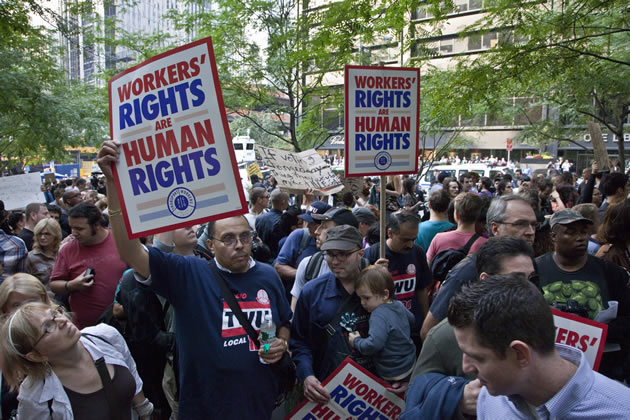
Transport Workers Union join with Occupy Wall Street in Lower Manhattan as thousands of protesters march against Wall Street and the country's economic problems.
Stand aside, citizen-protestors. The Occupy Wall Street movement is about to get professional help. New York City labor unions have decided to join the demonstrations. Members of the Service Employees International Union and the United Federation of Teachers, among other unions, will soon be marching with the protestors.
Why is the union movement making common cause with disgruntled students?
Because these protests are useful vehicles. Unions can use them to marshal support for special-interest policies that benefit them. Take a look at some of the protestors’ “demands”:
Restoration of the living wage. This demand can only be met by ending “Freetrade” by re-imposing trade tariffs on all imported goods entering the American market to level the playing field for domestic family farming and domestic manufacturing as most nations that are dumping cheap products onto the American market have radical wage and environmental regulation advantages.
Another policy that must be instituted is raise the minimum wage to twenty dollars an hr.
Few of the protestors in the Occupy Wall Street movement understand economics or the damage these policies would do if Congress actually enacted them. They truly believe that “These demands will create so many jobs it will be completely impossible to fill them without an open borders policy.”
Both economics and history show otherwise. Herbert Hoover did exactly what the protestors are demanding when he signed the Smoot–Hawley Tariff Act in 1930. International trade largely shut down, and this made the Great Depression even worse.
American Samoa and the Northern Mariana Islands both recently had “living wage” laws thrust on them when Congress decided to stop exempting them from the federal minimum wage. In these territories with low costs of living, employers had to raise wages substantially. This caused them to hire a lot fewer workers. Shutting down trade and instituting a national $20-per-hour minimum wage would seriously hurt the economy.
Such moves would, however, help unions. Unionized firms tend to be less competitive than nonunion businesses. Making the economy more competitive, such as by reducing trade barriers, also tends to reduce union membership.
Similarly, many union members are highly skilled, so raising the minimum wage does not risk their jobs. But it does make unskilled labor more expensive, and that makes hiring skilled (i.e. union) workers relatively more attractive. A living wage means fewer jobs for unskilled workers and more money for union members.
If enacted, the protestors’ dreams would prove an economic nightmare—but they would benefit the union movement. Small wonder, then, that organized labor has decided to join in.



























